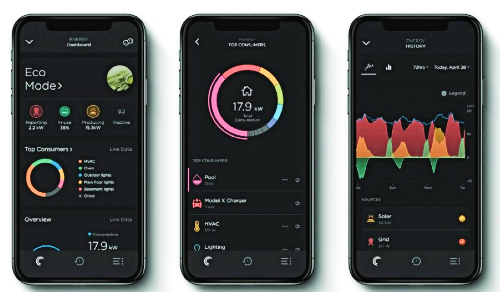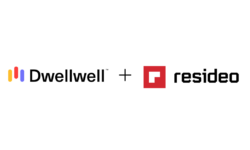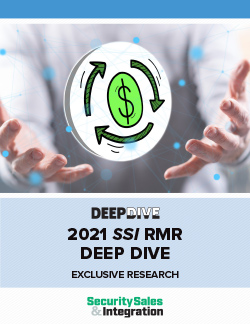Energy Management Potential Comes Into Focus in 2022
As consumers and builders demand increased energy savings and reduced grid reliance, residential tech pros are armed with more power and tools to deliver.

Automation provider Savant acquired Racepoint Energy (now Savant Power), and customers can implement various energy modes among the intelligent power controls.
A few years ago, as high-end energy storage and management systems entered the market, real potential began to arise for residential consumer electronics (CE) and security pros to think about becoming an energy automation contractor.
If you were hesitant back then, the timing is ripe now to reconsider. Pieces that may have been disparate previously are tying together, and prominent names in home automation will be driving more dealer adoption as energy, alternative energy and control systems become more tightly integrated.
Residential integrators are primed to “follow the money” that’s flowing into the home energy sector and meet growing customer/infrastructure demand.
Research Finds Consumers Ready to Take More Action
Smart home industry research firm Parks Associates recently outlined the increasing consumer interest in energy in its “Home Energy Management: Driving Consumer Engagement and New Revenue” whitepaper. Parks Associates surveyed consumers about their energy management behaviors and in the past three years there has been a 10% increase in interest related to saving energy, particularly in the category of “extreme measures,” which includes home improvements like installing rooftop solar panels, enterprise-grade energy storage, uninterruptible power supplies/backup power and control systems.
Meanwhile, Parks Associates found 84% of consumers are interested in taking “mindful actions” (e.g., adjusting thermostats, switching light bulbs to LEDs and turning off lights when rooms aren’t in use), while 33% of end users want to make minor home improvements to reduce energy consumption (e.g., adding insulation or buying more energy-efficient appliances or HVAC systems, which may involve an integrator).
Parks adds that increased home energy usage, leading to “bill shock,” during the pandemic has become a motivating factor among 20% of surveyed homeowners’ interested in energy management. The group notes that as the U.S. comes out of the pandemic, adoption of smart home devices will ramp up even further.
While Parks’ research was specifically developed for Cox Communications as analysis for the potential demand for solutions like Cox’s home energy management platform and programs from utilities, the conclusions serve the same model integrators can follow, as dealers’ energy solutions can range from more budget-friendly applications all the way up to aforementioned enterprise systems.
“Utilities can leverage the increasing presence of connected devices to achieve and expand energy management capabilities and functionality in the home,” says Patrice Samuels, senior analyst at Parks Associates. “By incorporating smart thermostats, smart lighting and smart plugs into energy management solutions, utilities can offer a comprehensive digital strategy to their customers that improves adoption of their energy management programs and generates additional revenue.”
Big Names Continue to Join the Energy Fray
The digitization of the home and ability to tie together alerts and automations, Parks notes, in general will increase consumer engagement in energy-saving actions, and that’s where integrators can take the lead. For integrators, more companies are enabling compatibility with automation systems and the ability to give consumers easy adjustments or preprogrammed settings for yielding true energy management as well as reducing reliance on the power grid.
Battery and energy storage provider sonnen not only has CEDIA channel presence but has made headlines in major outlets such as The New York Times and Forbes on the latest progressive communities being developed and built around its “Virtual Power Plants.” A sustainable sonnenCommunity launch in Westchester County, N.Y., in 2021, for example, will provide clean energy at a discounted rate to 200 homes in the pilot phase and plans include a local non-profit power program, local contractors and solar pros.
Speaking of solar, clearly that sector has caught the attention of the smart home and security folks, as major mainstream players Vivint and ADT became more entrenched in solar last year — the former entering in a strategic partnership with resi solar installer Freedom Forever and the latter acquiring Sunpro Solar and rebranding it ADT Solar.
RoseWater Energy has expanded its presence in the channel over the past year as well. Based in Florida where electrical surges and natural disasters always pose a threat, the company added CE veteran David Laikind as vice president, sales; became an Azione Unlimited partner brand; and brought on several new manufacturer’s rep firms.
On the automation side, popular control companies Crestron and Savant showed the importance of residential energy solutions (and potential future projects or additional revenue streams) in 2021.
In November, longtime Crestron specialist PanTech Design announced its Adapt Energy platform as the exclusive home energy solution for Crestron Home control systems. Adapt Energy will also become the first certified Crestron Integrated Partner solution for home energy management, according to PanTech Design CEO and founder Troy Morgan, who previously outlined Adapt Energy benefits during an episode of SSI sister publication’s CE Pro Podcast.
As a Crestron user, he’s been monitoring his own home’s energy using the Crestron Fusion system since 2012, he says. While he appreciated the ability to see and delve into the home’s energy usage, Morgan sought to do more.
“It wasn’t until a few years ago I saw sort of an opportunity for two industries to collide, where you have this energy industry over here doing all this solar stuff and home batteries and the like, and then you have this whole other industry — home automation. And with what we know, and what I’ve been playing around with for a while, bringing those two together just made a lot of sense,” says Morgan.
Adapt Energy debuted at Solar Power International and CEDIA Expo in 2018. It provides home energy management features such as automated circuit breaker control, energy monitoring, grid loss detection, severe weather alerts, custom energy management and full integration with home automation control systems including Crestron Home now.
“Home energy management is a growing market and represents tremendous value to homeowners. We believe it is a natural fit for the custom integration space. So, we are very excited about bringing energy management into the Crestron Home ecosystem,” adds John Clancy, executive vice president, Residential, at Crestron.
On the Savant front, the company augmented its case for integrators to be go-to providers for managing intelligent power solutions by acquiring Racepoint Energy (renaming it Savant Power) as part of its ever-growing residential technology ecosystem.
Savant Power president Anna Demeo explained to CE Pro that Savant Power and its intelligent power management functionalities address two major buckets.
“One is our smart electrical panel,” Demeo says. “We all have them in our homes or businesses, and they’re pretty much the same as they’ve always been — not much has changed in that industry. With Savant Power we are taking them into the 21st century, and what that means is we can now monitor in real- time and revenue grade all the energy in a home or business and control that in real-time has value.”
The other major aspect is the notion of a “microgrid,” which Demeo says not only can manage all the loads in a home via that smart power panel but also the sources that can potentially power today’s houses/businesses.
“It’s not just the grid anymore,” she says, mentioning alternatives such as solar, wind and battery. “And so what [Savant Power] does is takes all of these inputs as well as all of your loads, and then optimizes the system.”
Meanwhile, Resideo is chugging along with its energy management offering based on technology it acquired from LifeWhere and Whisker Labs. The solutions enable the company’s controller to monitor and react to various conditions in the home. LifeWhere measures the performance of home appliances and warns of potential breakdowns.
The unit acquired from Whisker Labs learns the heating and cooling patterns of a home, mashes it up with outdoor weather data, and auto-adjusts the indoor temperature for energy management and comfort. Both solutions come with a recurring fee, making it fit nicely into the business model of security specialists.
Arlen Schweiger is Executive Editor of CE Pro, an SSI sister publication, where this article first appeared.
If you enjoyed this article and want to receive more valuable industry content like this, click here to sign up for our FREE digital newsletters!

Security Is Our Business, Too
For professionals who recommend, buy and install all types of electronic security equipment, a free subscription to Commercial Integrator + Security Sales & Integration is like having a consultant on call. You’ll find an ideal balance of technology and business coverage, with installation tips and techniques for products and updates on how to add to your bottom line.
A FREE subscription to the top resource for security and integration industry will prove to be invaluable.








